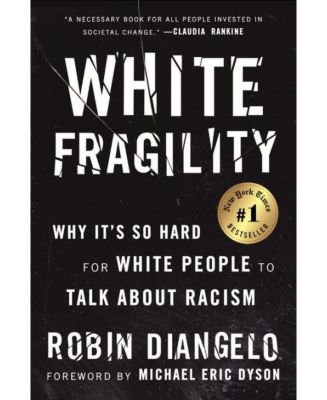White Fragility- Why It's So Hard for White People to Talk about Racism by Robin DiAngelo
Product details
Web ID: 712342031 reviews
White Fragility
Saw her in an interview. Was very unimpressed.

Customer review from barnesandnoble.com
An outstanding read
Fill with a lot of uncomfortable conversations this book will turn some reader away. But if you stick with you’ll learn a lot about the world(The US really) and yourself.
Recommends this product

Customer review from barnesandnoble.com
Ready to Change Your Fragile Ways?
I have just finished reading this exceptionally perceptive book and I highly recommend it to the entire Western world. It was possibly the most informative book on this topic that I've ever read. Brimming with wisdom, it also includes some specific actions people can take to disrupt our socialized patterns and assumptions.

Customer review from barnesandnoble.com
An Essential Read
My advice to anyone reading the reviews, pondering whether or not to purchase this book, purchase it. Those who’ve left one star reviews are merely offended at the notion that maybe they themselves aren’t as anti-racist as they initially believed. A book with such subject matter is bound to draw criticism from those who are part of the problem, ultimately proving her assertion (the prevalence of the titular “white fragility”). This book was written by a white individual who understands her position in upholding white supremacy and rather than sit idly by (not defend nor speak up on racial injustice), she decided to utilize said position to both encourage and enlighten white people to start fixing the problem. I am a black person and I can say that we are definitely raised in a white supremacist society, everything I’ve encountered whilst speaking about race relations to a white person is beautifully addressed in this book. If it makes you uncomfortable? That’s the point! Learn from it and grow, don’t be docile and complacent with an issue that affects human lives. Read. This. Book.
Recommends this product

Customer review from barnesandnoble.com
Difficult to Process if You’re Not Ready
It’s frustrating to see so many negative reviews, so I came on here to offer my opinion of this book. If you’re not ready to learn difficult truths about yourself or the white supremacist culture we live in, then the information in this book will be difficult to absorb and process. This author approaches racism from a very necessary standpoint: all white people are racist because we’re raised in a culture of white supremacy. Examples: most entertainment media features white protagonists, a majority of journalists are white, a majority of politicians are white, etc. White people are taken more seriously than people of color. The negative reviews outline how quickly some white people can be to dismiss the hardships of people of color. The criticism offered to white people isn’t that they’re consciously racist, but rather inherently and unconsciously so. It outlines how you can work against a system that is meant to silence a minority. This book has allowed me to listen better and help more. I encourage anyone to read this book, but be sure to do so with an open mind.
Recommends this product

Customer review from barnesandnoble.com
Brilliant insights based on long experience
The author's experience across many years of working on racism with white people and POC, as well as grappling with her own unconscious prejudice, gives us a strong foundation for disrupting racism in ourselves and our circles. I am disheartened but not surprised at the number of one-star reviewers who have singled out some narrow aspect and jumped to the conclusion that the entire book is worthless or worse. One-star for such a searching, informed analysis replete with examples of white people, including the author, reacting in a fragile way to being confronted? Why not even two or three stars to acknowledge the validity of other parts of the book? The obvious answer is that the one-star reviewers had strong, emotional reactions: "In the early days of my work ..., I was taken aback by how angry and defensive so many white people became at the suggestion that they were connected to racism in any way." Introduction, page 2. Contrast the content of the one-star reviews with the five-star reviews. The positive reviewers describe personal accounts of recognizing their own behaviors and reactions, of gaining new awareness and understanding. I have not seen such a strong, bimodal distribution of reviews for any book. We have a long way to go to disrupt racism!
Recommends this product

Customer review from barnesandnoble.com
sloppiness and broad generalizations
In his book, Racism Without Racists, Eduardo Bonilla-Silva writes, "Nevertheless, recognizing the political nature of research is not a green light for sloppiness and one-sidedness or for relying on unsystematically gathered data to make broad generalizations." Sloppiness and broad generalizations are what you get in Robin DiAngelo's book. She blames Thomas Jefferson for inventing the idea of "race," but doesn't do us the favor of showing us where exactly he supposedly did this. It's as if proving her assertions is beside the point for her. She is able to tell you exactly how every single person of color will react to something someone might say. Having been terribly disappointed with DiAngelo's book, I am now reading Bonilla-Silva's.

Customer review from barnesandnoble.com
Wish I could get my time back
This book was such a pathetic take on race relations. To think racism is a one way street and if I don’t agree with you, it just shows how racist I really am. Where does this woman get off. When did Robin DiAngelo become the authority of social interactions and now society was created. I read the book because of curiosity. I had a feeling it was going to be nonsensical.

Customer review from barnesandnoble.com

